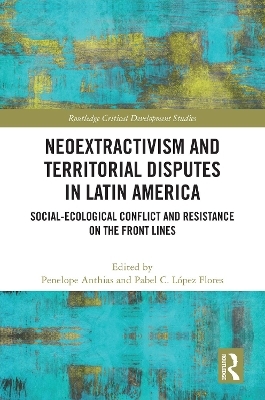
Neoextractivism and Territorial Disputes in Latin America
Routledge (Verlag)
978-1-032-21238-8 (ISBN)
This book reflects on the continuing expansion of extractive forms of capitalist development into new territories in Latin America, and the resistance movements that are trying to combat the ecological and social destruction that follows.
Latin American development models continue to prioritise extractivism: the intensive exploitation and exportation of nature in its primary commodity form. This constant expansion of the extractive frontier into new territories leads to forms of place-based resistance, negotiation and struggle in which competing territorial projects and claims are at stake. This book uncovers the underlying trends and dynamics of these ‘territorialities in dispute’, and the socio- ecological resistance movements that are emerging as marginalized communities struggle to reclaim their territorial rights and defend and protect their right of access to the global commons. A focus on territorialities in dispute renders visible the unsustainable expansion of extractivist territories and opens up new horizons to learn from these processes and to consider post-extractivist/post-development imaginings of another world and alternate futures – as well as the challenges to their realisation.
This book will be of interest to both students and researchers in the fields of international development, political ecology, critical geography, social anthropology as well as to activists engaged in socio-ecological/eco-territorial movements.
Penelope Anthias is Assistant Professor in Human Geography at Durham University, UK. Her research investigates struggles over territory, resources and citizenship in Bolivia based on long-term ethnographic and participatory research with Indigenous and peasant communities. She is the author of Limits to Decolonization: Indigeneity, Territory and Hydrocarbon Politics in the Bolivian Chaco (Cornell University Press, 2018), a Spanish translation of which was recently published in Bolivia (Plural Editores, 2022). In 2022, she directed and produced Tariquía no se toca, a documentary film on women’s resistance to hydrocarbon development in the Tariquía National Reserve of Flora and Fauna. She has a PhD in Geography from the University of Cambridge (2014) and completed postdoctoral positions at the University of California, Berkeley and the University of Copenhagen. Pabel C. López Flores is Bolivian-Italian social researcher, with a PhD in Sociology at Scuola Normale Superiore/University of Milan ‘Bicocca’ (Italy). He is Associate Researcher in Postgraduate in Development Sciences, Universidad Mayor de San Andrés CIDES-UMSA (Bolivia) and distinguished visiting researcher at the Institute of Latin American Studies at the University of Sevilla, IEALC-US (Spain). His current research interests include fields of political sociology, sociology of social movements and sociology of territory, in a trans-disciplinary perspective.
Introduction PART I The territorial dynamics of (neo)extractivism in Latin America: the characteristics and scope of the current phase 1: Extractivism: from the roots and scope of a concept to the political horizons of its struggles 2. Resistance to dispossession and environmental suffering in territories sacrificed by neoextractivism: the example of Chile 3. The Amazon exposed in the Venezuelan Great Crisis (2013-2021): the rise of an extractivism of hybrid governances PART II Territorialities in dispute and the dialectic of re-/de-colonializacion 4. The expansion of agribusiness and territorial conflicts in the Cerrado of Central-North Brazil: the pillaging of land, water and native vegetation 5. Mapuche resistances and alternatives to fracking in Vaca Muerta, (Neuquen, Argentina) 6. Neoextractivism, agribusiness and water scarcity in contemporary Chile 7. Disputed territories, institutions and autonomies: perspectives from three decades of contemporary extractivism in Peru PART III Societal movements, territorial re-existences and alternative horizons 8: Politicizing prior public consultations: notes on the re-existence of the Munduruku people and riverside communities against the construction of hydro-electrical plants in the Middle Tapajós region, Amazonia 9. In defense of life: the existential politics of relating body and territory 10: Sovereignty against extractivism: re-centring decolonisation on Indigenous territorial struggles in Bolivia
| Erscheinungsdatum | 29.09.2023 |
|---|---|
| Reihe/Serie | Routledge Critical Development Studies |
| Zusatzinfo | 6 Tables, black and white; 9 Line drawings, black and white; 9 Halftones, black and white; 18 Illustrations, black and white |
| Verlagsort | London |
| Sprache | englisch |
| Maße | 156 x 234 mm |
| Gewicht | 200 g |
| Themenwelt | Sozialwissenschaften ► Soziologie ► Spezielle Soziologien |
| Technik ► Umwelttechnik / Biotechnologie | |
| ISBN-10 | 1-032-21238-1 / 1032212381 |
| ISBN-13 | 978-1-032-21238-8 / 9781032212388 |
| Zustand | Neuware |
| Informationen gemäß Produktsicherheitsverordnung (GPSR) | |
| Haben Sie eine Frage zum Produkt? |
aus dem Bereich


